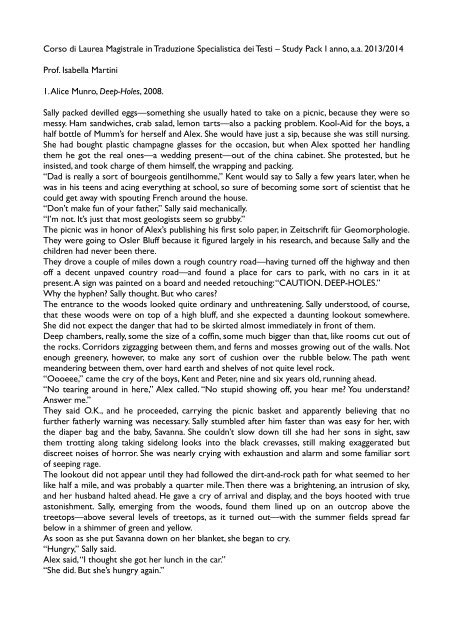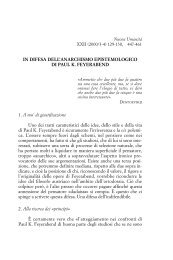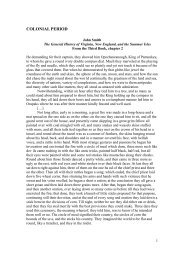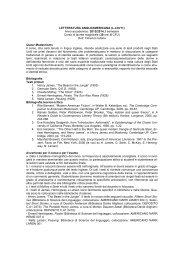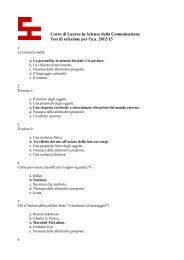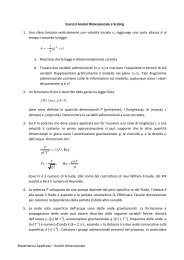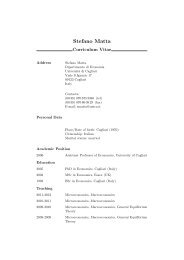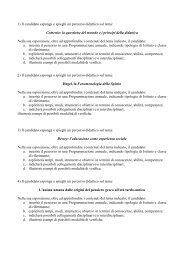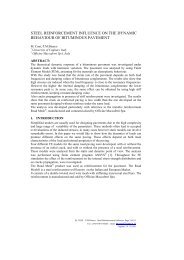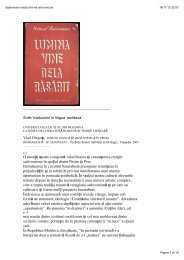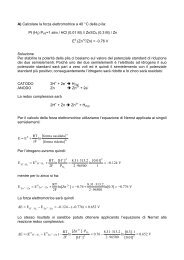Create successful ePaper yourself
Turn your PDF publications into a flip-book with our unique Google optimized e-Paper software.
Corso di Laurea Magistrale in Traduzione Specialistica dei Testi – <strong>Study</strong> Pack I anno, a.a. 2013/2014<br />
Prof. Isabella Martini<br />
1. Alice Munro, Deep-Holes, 2008.<br />
Sally <strong>pack</strong>ed devilled eggs—something she usually hated to take on a picnic, because they were so<br />
messy. Ham sandwiches, crab salad, lemon tarts—also a <strong>pack</strong>ing problem. Kool-Aid for the boys, a<br />
half bottle of Mumm’s for herself and Alex. She would have just a sip, because she was still nursing.<br />
She had bought plastic champagne glasses for the occasion, but when Alex spotted her handling<br />
them he got the real ones—a wedding present—out of the china cabinet. She protested, but he<br />
insisted, and took charge of them himself, the wrapping and <strong>pack</strong>ing.<br />
“Dad is really a sort of bourgeois gentilhomme,” Kent would say to Sally a few years later, when he<br />
was in his teens and acing everything at school, so sure of becoming some sort of scientist that he<br />
could get away with spouting French around the house.<br />
“Don’t make fun of your father,” Sally said mechanically.<br />
“I’m not. It’s just that most geologists seem so grubby.”<br />
The picnic was in honor of Alex’s publishing his first solo paper, in Zeitschrift für Geomorphologie.<br />
They were going to Osler Bluff because it figured largely in his research, and because Sally and the<br />
children had never been there.<br />
They drove a couple of miles down a rough country road—having turned off the highway and then<br />
off a decent unpaved country road—and found a place for cars to park, with no cars in it at<br />
present. A sign was painted on a board and needed retouching: “CAUTION. DEEP-HOLES.”<br />
Why the hyphen? Sally thought. But who cares?<br />
The entrance to the woods looked quite ordinary and unthreatening. Sally understood, of course,<br />
that these woods were on top of a high bluff, and she expected a daunting lookout somewhere.<br />
She did not expect the danger that had to be skirted almost immediately in front of them.<br />
Deep chambers, really, some the size of a coffin, some much bigger than that, like rooms cut out of<br />
the rocks. Corridors zigzagging between them, and ferns and mosses growing out of the walls. Not<br />
enough greenery, however, to make any sort of cushion over the rubble below. The path went<br />
meandering between them, over hard earth and shelves of not quite level rock.<br />
“Oooeee,” came the cry of the boys, Kent and Peter, nine and six years old, running ahead.<br />
“No tearing around in here,” Alex called. “No stupid showing off, you hear me? You understand?<br />
Answer me.”<br />
They said O.K., and he proceeded, carrying the picnic basket and apparently believing that no<br />
further fatherly warning was necessary. Sally stumbled after him faster than was easy for her, with<br />
the diaper bag and the baby, Savanna. She couldn’t slow down till she had her sons in sight, saw<br />
them trotting along taking sidelong looks into the black crevasses, still making exaggerated but<br />
discreet noises of horror. She was nearly crying with exhaustion and alarm and some familiar sort<br />
of seeping rage.<br />
The lookout did not appear until they had followed the dirt-and-rock path for what seemed to her<br />
like half a mile, and was probably a quarter mile. Then there was a brightening, an intrusion of sky,<br />
and her husband halted ahead. He gave a cry of arrival and display, and the boys hooted with true<br />
astonishment. Sally, emerging from the woods, found them lined up on an outcrop above the<br />
treetops—above several levels of treetops, as it turned out—with the summer fields spread far<br />
below in a shimmer of green and yellow.<br />
As soon as she put Savanna down on her blanket, she began to cry.<br />
“Hungry,” Sally said.<br />
Alex said, “I thought she got her lunch in the car.”<br />
“She did. But she’s hungry again.”
She got Savanna latched on to one side and with her free hand unfastened the picnic basket. This<br />
was not how Alex had envisioned things. But he gave a good-humored sigh and retrieved the<br />
champagne glasses from their wrappings in his pockets, placing them on their sides on a patch of<br />
grass.<br />
“Glug glug. I’m thirsty, too,” Kent said, and Peter immediately imitated him.<br />
“Glug glug. Me, too. Glug glug.”<br />
“Shut up,” Alex said.<br />
Kent said, “Shut up, Peter.”<br />
Alex said to Sally, “What did you bring for them to drink?”<br />
“Kool-Aid, in the blue jug. The plastic glasses are in a napkin on top.”<br />
Of course, Alex believed that Kent had started that nonsense not because he was really thirsty but<br />
because he was crudely excited by the sight of Sally’s breast. He thought it was high time that<br />
Savanna was transferred to the bottle—she was nearly six months old. And he thought Sally was<br />
far too casual about the whole procedure, sometimes going around the kitchen doing things with<br />
one hand while the infant guzzled. With Kent sneaking peeks and Peter referring to Mommy’s milk<br />
jugs. That came from Kent, Alex said. Kent was a troublemaker and the possessor of a dirty mind.<br />
“Well, I have to do things,” Sally said.<br />
“That’s not one of the things you have to do. You could have her on the bottle tomorrow.”<br />
“I will soon. Not quite tomorrow, but soon.”<br />
But here she is, still letting Savanna and the milk jugs dominate the picnic.<br />
The Kool-Aid is poured, then the champagne. Sally and Alex touch glasses, with Savanna between<br />
them. Sally has her sip and wishes she could have more. She smiles at Alex to communicate this<br />
wish, and maybe the idea that it would be nice to be alone with him. He drinks his champagne, and,<br />
as if her sip and smile were enough to soothe him, he starts in on the picnic. She points out which<br />
sandwiches have the mustard he likes and which have the mustard she and Peter like and which are<br />
for Kent, who likes no mustard at all.<br />
While this is going on, Kent manages to slip behind her and finish up her champagne. Peter must<br />
have seen him do this, but for some peculiar reason he does not tell on him. Sally discovers what<br />
has happened some time later and Alex never knows about it at all, because he soon forgets that<br />
there was anything left in her glass and <strong>pack</strong>s it neatly away with his own, while telling the boys<br />
about dolostone. They listen, presumably, as they gobble up the sandwiches and ignore the devilled<br />
eggs and crab salad and grab the tarts.<br />
Dolostone, Alex says, is the thick caprock they can see. Underneath it is shale, clay turned into<br />
rock, very fine, fine-grained. Water works through the dolostone and when it gets to the shale it<br />
just lies there; it can’t get through the thin layers. So the erosion—that’s the destruction of the<br />
dolostone—is caused as the water works its way back to its source, eats a channel back, and the<br />
caprock develops vertical joints. Do they know what “vertical” means?<br />
“Up and down,” Kent says lackadaisically.<br />
“Weak vertical joints, and they get to lean out and then they leave crevasses behind them and after<br />
millions of years they break off altogether and go tumbling down the slope.”<br />
“I have to go,” Kent says.<br />
“Go where?”<br />
“I have to go pee.”<br />
“Oh, for God’s sake, go.”<br />
“Me, too,” Peter says.<br />
Sally clamps her mouth down on the automatic injunction to be careful. Alex looks at her and<br />
approves of the clamping down. They smile faintly at each other.<br />
Savanna has fallen asleep, her lips slack around the nipple. With the boys out of the way, it’s easier<br />
to detach her. Sally can burp her and settle her on the blanket, without worrying about an exposed<br />
breast. If Alex finds the sight distasteful—she knows he dislikes the whole conjunction of sex and<br />
nourishment, his wife’s breasts turned into udders—he can look away, and he does.
As she buttons herself up, there comes a cry, not sharp but lost, diminishing, and Alex is on his feet<br />
before she is, running along the path. Then a louder cry getting closer. It’s Peter.<br />
“Kent falled in. Kent falled in.”<br />
His father yells, “I’m coming.”<br />
Sally will always believe that she knew at once—even before she heard Peter’s voice, she knew<br />
what had happened. If an accident had happened, it would not be to her six-year-old, who was<br />
brave but not inventive, not a showoff. It would be to Kent. She could see exactly how—peeing<br />
into a hole, balancing on the rim, teasing Peter, teasing himself.<br />
He was alive. He was lying far down in the rubble at the bottom of the crevasse, but he was<br />
moving his arms, struggling to push himself up. Struggling so feebly. One leg caught under him, the<br />
other oddly bent.<br />
“Can you carry the baby?” she said to Peter. “Go back to the picnic and put her on the blanket and<br />
watch her. That’s my good boy. My good strong boy.”<br />
Alex was on his way into the hole, scrambling down, telling Kent to stay still. Getting down in one<br />
piece was just possible. It would be getting Kent out that was hard.<br />
Should she run to the car and see if there was a rope? Tie the rope around a tree trunk? Maybe tie<br />
it around Kent’s body so she could lift him when Alex raised him up to her?<br />
There wouldn’t be a rope. Why would there be a rope?<br />
Alex had reached him. He bent and lifted him. Kent gave a beseeching scream of pain. Alex draped<br />
him around his shoulders, Kent’s head hanging down on one side and useless legs—one so<br />
unnaturally protruding—on the other. He rose, stumbled a couple of steps, and while still hanging<br />
on to Kent dropped back down to his knees. He had decided to crawl and was making his way—<br />
Sally understood this now—to the rubble that partly filled the far end of the crevasse. He shouted<br />
some order to her without raising his head, and though she could not make out any word she<br />
knew what he wanted. She got up off her knees—why was she on her knees?—and pushed<br />
through some saplings to that edge of the rim, where the rubble came to within perhaps three feet<br />
of the surface. Alex was still crawling along with Kent dangling from him like a shot deer.<br />
She called, “I’m here. I’m here.”<br />
Kent would have to be raised up by his father, pulled to the solid shelf of rock by his mother. He<br />
was a skinny boy, who had not yet reached his first spurt of growth, but he seemed as heavy as a<br />
bag of cement. Sally’s arms could not do it on the first try. She shifted her position, crouching<br />
instead of lying flat on her stomach, and with the full power of her shoulders and chest and with<br />
Alex supporting and lifting Kent’s body from beneath they heaved him over. Sally fell back with him<br />
in her arms and saw his eyes open, then roll back in his head as he fainted again.<br />
When Alex had clawed his way out, they collected the other children and drove to the<br />
Collingwood Hospital. There seemed to be no internal injury. Both legs were broken. One break<br />
was clean, as the doctor put it. The other leg was shattered.<br />
“Kids have to be watched every minute in there,” he said sternly to Sally, who had gone into the<br />
examining room with Kent while Alex managed Peter and Savanna. “Haven’t they got any warning<br />
signs up?”<br />
With Alex, she thought, he would have spoken differently. “That’s the way boys are. Turn your back<br />
and they’re tearing around where they shouldn’t be,” he would have said.<br />
Her gratitude—to God, whom she did not believe in, and to Alex, whom she did—was so immense<br />
that she resented nothing.<br />
2. Kathryn Stockett, The Help, 2009.<br />
AIBILEEN<br />
Chapter 1
August 1962<br />
MAE MOBLEY was born on a early Sunday morning in August, 1960. A church baby we like to call<br />
it. Taking care a white babies, that’s what I do, along with all the cooking and the cleaning. I done<br />
raised seventeen kids in my lifetime. I know how to get them babies to sleep, stop crying, and go in<br />
the toilet bowl before they mamas even get out a bed in the morning.<br />
But I ain’t never seen a baby yell like Mae Mobley Leefolt. First day I walk in the door, there she be,<br />
red-hot and hollering with the colic, fighting that bottle like it’s a rotten turnip. Miss Leefolt, she<br />
look terrified a her own child. “What am I doing wrong? Why can’t I stop it?”<br />
It? That was my first hint: something is wrong with this situation.<br />
So I took that pink, screaming baby in my arms. Bounced her on my hip to get the gas moving and<br />
it didn’t take two minutes fore Baby Girl stopped her crying, got to smiling up at me like she do.<br />
But Miss Leefolt, she don’t pick up her own baby for the rest a the day. I seen plenty a womens get<br />
the baby blues after they done birthing. I reckon I thought that’s what it was.<br />
Here’s something about Miss Leefolt: she not just frowning all the time, she skinny. Her legs is so<br />
spindly, she look like she done growed em last week. Twenty-three years old and she lanky as a<br />
fourteen-year-old boy. Even her hair is thin, brown, see-through. She try to tease it up, but it only<br />
make it look thinner. Her face be the same shape as that red devil on the redhot candy box, pointy<br />
chin and all. Fact, her whole body be so full a sharp knobs and corners, it’s no wonder she can’t<br />
soothe that baby. Babies like fat. Like to bury they face up in you armpit and go to sleep. They like<br />
big fat legs too. That I know.<br />
By the time she a year old, Mae Mobley following me around everwhere I go. Five o’clock would<br />
come round and she’d be hanging on my Dr. Scholl shoe, dragging over the floor, crying like I<br />
weren’t never coming back. Miss Leefolt, she’d narrow up her eyes at me like I done something<br />
wrong, unhitch that crying baby off my foot. I reckon that’s the risk you run, letting somebody else<br />
raise you chilluns.<br />
Mae Mobley two years old now. She got big brown eyes and honey-color curls. But the bald spot in<br />
the back of her hair kind a throw things off. She get the same wrinkle between her eyebrows when<br />
she worried, like her mama. They kind a favor except Mae Mobley so fat. She ain’t gone be no<br />
beauty queen. I think it bother Miss Leefolt, but Mae Mobley my special baby.<br />
I LOST MY OWN BOY, Treelore, right before I started waiting on Miss Leefolt. He was twentyfour<br />
years old. The best part of a person’s life. It just wasn’t enough time living in this world.<br />
He had him a little apartment over on Foley Street. Seeing a real nice girl name Frances and I spec<br />
they was gone get married, but he was slow bout things like that. Not cause he looking for<br />
something better, just cause he the thinking kind. Wore big glasses and reading all the time. He even<br />
start writing his own book, bout being a colored man living and working in Mississippi. Law, that<br />
made me proud. But one night he working late at the Scanlon-Taylor mill, lugging two-by-fours to<br />
the truck, splinters slicing all the way through the glove. He too small for that kind a work, too<br />
skinny, but he needed the job. He was tired. It was raining. He slip off the loading dock, fell down on<br />
the drive. Tractor trailer didn’t see him and crushed his lungs fore he could move. By the time I<br />
found out, he was dead.<br />
That was the day my whole world went black. Air look black, sun look black. I laid up in bed and<br />
stared at the black walls a my house. Minny came ever day to make sure I was still breathing, feed<br />
me food to keep me living. Took three months fore I even look out the window, see if the world<br />
still there. I was surprise to see the world didn’t stop just cause my boy did.<br />
Five months after the funeral, I lifted myself up out a bed. I put on my white uniform and put my<br />
little gold cross back around my neck and I went to wait on Miss Leefolt cause she just have her<br />
baby girl. But it weren’t too long before I seen something in me had changed. A bitter seed was<br />
planted inside a me.<br />
And I just didn’t feel so accepting anymore.
“GET THE HOUSE straightened up and then go on and fix some of that chicken salad now,” say<br />
Miss Leefolt.<br />
It’s bridge club day. Every fourth Wednesday a the month. A course I already got everthing ready to<br />
go—made the chicken salad this morning, ironed the tablecloths yesterday. Miss Leefolt seen me at<br />
it too. She ain’t but twenty-three years old and she like hearing herself tell me what to do.<br />
She already got the blue dress on I ironed this morning, the one with sixty-five pleats on the waist,<br />
so tiny I got to squint through my glasses to iron. I don’t hate much in life, but me and that dress is<br />
not on good terms.<br />
“And you make sure Mae Mobley’s not coming in on us, now. I tell you, I am so burned up at her—<br />
tore up my good stationery into five thousand pieces and I’ve got fifteen thank-you notes for the<br />
Junior League to do . . .”<br />
I arrange the-this and the-that for her lady friends. Set out the good crystal, put the silver service<br />
out. Miss Leefolt don’t put up no dinky card table like the other ladies do. We set at the dining<br />
room table. Put a cloth on top to cover the big L-shaped crack, move that red flower centerpiece<br />
to the sideboard to hide where the wood all scratched. Miss Leefolt, she like it fancy when she do<br />
a luncheon. Maybe she trying to make up for her house being small. They ain’t rich folk, that I<br />
know. Rich folk don’t try so hard.<br />
I’m used to working for young couples, but I spec this is the smallest house I ever worked in. It’s<br />
just the one story. Her and Mister Leefolt’s room in the back be a fair size, but Baby Girl’s room be<br />
tiny. The dining room and the regular living room kind a join up. Only two bathrooms, which is a<br />
relief cause I worked in houses where they was five or six. Take a whole day just to clean toilets.<br />
Miss Leefolt don’t pay but ninety-five cents an hour, less than I been paid in years. But after<br />
Treelore died, I took what I could. Landlord wasn’t gone wait much longer. And even though it’s<br />
small, Miss Leefolt done the house up nice as she can. She pretty good with the sewing machine.<br />
Anything she can’t buy new of, she just get her some blue material and sew it a cover.<br />
The doorbell ring and I open it up.<br />
“Hey, Aibileen,” Miss Skeeter say, cause she the kind that speak to the help. “How you?” “Hey, Miss<br />
Skeeter. I’m alright. Law, it’s hot out there.”<br />
Miss Skeeter real tall and skinny. Her hair be yellow and cut short above her shoulders cause she<br />
get the frizz year round. She twenty-three or so, same as Miss Leefolt and the rest of em. She set<br />
her pocketbook on the chair, kind a itch around in her clothes a second. She wearing a white lace<br />
blouse buttoned up like a nun, flat shoes so I reckon she don’t look any taller. Her blue skirt gaps<br />
open in the waist. Miss Skeeter always look like somebody else told her what to wear.<br />
I hear Miss Hilly and her mama, Miss Walter, pull up the driveway and toot the horn. Miss Hilly<br />
don’t live but ten feet away, but she always drive over. I let her in and she go right past me and I<br />
figure it’s a good time to get Mae Mobley up from her nap.<br />
Soon as I walk in her nursery, Mae Mobley smile at me, reach out her fat little arms. “You already<br />
up, Baby Girl? Why you didn’t holler for me?”<br />
She laugh, dance a little happy jig waiting on me to get her out. I give her a good hug. I reckon she<br />
don’t get too many good hugs like this after I go home. Ever so often, I come to work and find her<br />
bawling in her crib, Miss Leefolt busy on the sewing machine rolling her eyes like it’s a stray cat<br />
stuck in the screen door. See, Miss Leefolt, she dress up nice ever day. Always got her makeup on,<br />
got a carport, double-door Frigidaire with the built-in icebox. You see her in the Jitney 14 grocery,<br />
you never think she go and leave her baby crying in her crib like that. But the help always know.<br />
Today is a good day though. That girl just grins. I say, “Aibileen.”<br />
She say, “Aib-ee.”<br />
I say, “Love.”<br />
She say, “Love.”<br />
I say, “Mae Mobley.”<br />
She say, “Aib-ee.” And then she laugh and laugh. She so tickled she talking and I got to say, it’s about<br />
time. Treelore didn’t say nothing till he two either. By the time he in third grade, though, he get to<br />
talking better than the President a the United States, coming home using words like conjugation
and parliamentary. He get in junior high and we play this game where I give him a real simple word<br />
and he got to come up with a fancy one like it. I say housecat, he say domesticized feline, I say<br />
mixer and he say motorized rotunda. One day I say Crisco. He scratch his head. He just can’t<br />
believe I done won the game with something simple as Crisco. Came to be a secret joke with us,<br />
meaning something you can’t dress up no matter how you try. We start calling his daddy Crisco<br />
cause you can’t fancy up a man done run off on his family. Plus he the greasiest no-count you ever<br />
known.<br />
I tote Mae Mobley into the kitchen and put her in her high chair, thinking about two chores I need<br />
to finish today fore Miss Leefolt have a fit: separate the napkins that started to fray and straighten<br />
up the silver service in the cabinet. Law, I’m on have to do it while the ladies is here, I guess.<br />
I take the tray a devil eggs out to the dining room. Miss Leefolt setting at the head and to her left<br />
be Miss Hilly Holbrook and Miss Hilly’s mama, Miss Walter, who Miss Hilly don’t treat with no<br />
respect. And then on Miss Leefolt’s right be Miss Skeeter.<br />
I make the egg rounds, starting with ole Miss Walter first cause she the elder. It’s warm in here, but<br />
she got a thick brown sweater drooped around her shoulders. She scoop a egg up and near bout<br />
drop it cause she getting the palsy. Then I move over to Miss Hilly and she smile and take two. Miss<br />
Hilly got a round face and dark brown hair in the beehive. Her skin be olive color, with freckles and<br />
moles. She wear a lot a red plaid. And she getting heavy in the bottom. Today, since it’s so hot, she<br />
wearing a red sleeveless dress with no waist to it. She one a those grown ladies that still dress like<br />
a little girl with big bows and matching hats and such. She ain’t my favorite.<br />
I move over to Miss Skeeter, but she wrinkle her nose up at me and say, “No, thanks,” cause she<br />
don’t eat no eggs. I tell Miss Leefolt ever time she have the bridge club and she make me do them<br />
eggs anyways. She scared Miss Hilly be disappointed.<br />
Finally, I do Miss Leefolt. She the hostess so she got to pick up her eggs last. And soon as I’m done,<br />
Miss Hilly say, “Don’t mind if I do,” and snatch herself two more eggs, which don’t surprise me.<br />
“Guess who I ran into at the beauty parlor?” Miss Hilly say to the ladies.<br />
“Who’s that?” ask Miss Leefolt.<br />
“Celia Foote. And do you know what she asked me? If she could help with the Benefit this year.”<br />
“Good,” Miss Skeeter say. “We need it.”<br />
“Not that bad, we don’t. I told her, I said, ‘Celia, you have to be a League member or a sustainer to<br />
participate.’ What does she think the Jackson League is? Open rush?”<br />
“Aren’t we taking nonmembers this year? Since the Benefit’s gotten so big?” Miss Skeeter ask.<br />
“Well, yes,” Miss Hilly say. “But I wasn’t about to tell her that.”<br />
“I can’t believe Johnny married a girl so tacky like she is,” Miss Leefolt say and Miss Hilly nod. She<br />
start dealing out the bridge cards.<br />
I spoon out the congealed salad and the ham sandwiches, can’t help but listen to the chatter. Only<br />
three things them ladies talk about: they kids, they clothes, and they friends. I hear the word<br />
Kennedy, I know they ain’t discussing no politic. They talking about what Miss Jackie done wore on<br />
the tee-vee.<br />
When I get around to Miss Walter, she don’t take but one little old half a sandwich for herself.<br />
“Mama,” Miss Hilly yell at Miss Walter, “Take another sandwich. You are skinny as a telephone pole.”<br />
Miss Hilly look over at the rest a the table. “I keep telling her, if that Minny can’t cook she needs to<br />
just go on and fire her.”<br />
My ears perk up at this. They talking bout the help. I’m best friends with Minny. “Minny cooks fine,”<br />
say ole Miss Walter. “I’m just not so hungry like I used to be.”<br />
Minny near bout the best cook in Hinds County, maybe even all a Mississippi. The Junior League<br />
Benefit come around ever fall and they be wanting her to make ten caramel cakes to auction off.<br />
She ought a be the most sought-after help in the state. Problem is, Minny got a mouth on her. She<br />
always talking back. One day it be the white manager a the Jitney Jungle grocery, next day it be her<br />
husband, and ever day it’s gone be the white lady she waiting on. The only reason she waiting on<br />
Miss Walter so long is Miss Walter be deaf as a doe-nob.
“I think you’re malnutritioned, Mama,” holler Miss Hilly. “That Minny isn’t feeding you so that she<br />
can steal every last heirloom I have left.” Miss Hilly huff out a her chair. “I’m going to the powder<br />
room. Y’all watch her in case she collapses dead of hunger.”<br />
When Miss Hilly gone, Miss Walter say real low, “I bet you’d love that.” Everbody act like they didn’t<br />
hear. I better call Minny tonight, tell her what Miss Hilly said.<br />
In the kitchen, Baby Girl’s up in her high chair, got purple juice all over her face. Soon as I walk in,<br />
she smile. She don’t make no fuss being in here by herself, but I hate to leave her too long. I know<br />
she stare at that door real quiet till I come back.<br />
I pat her little soft head and go back out to pour the ice tea. Miss Hilly’s back in her chair looking<br />
all bowed up about something else now. “Oh Hilly, I wish you’d use the guest bathroom,” say Miss<br />
Leefolt, rearranging her cards. “Aibileen doesn’t clean in the back until after lunch.”<br />
Hilly raise her chin up. Then she give one a her “ah-hem’s.” She got this way a clearing her throat<br />
real delicate-like that get everbody’s attention without they even knowing she made em do it.<br />
“But the guest bathroom’s where the help goes,” Miss Hilly say.<br />
Nobody says anything for a second. Then Miss Walter nod, like she explaining it all. “She’s upset<br />
cause the Nigra uses the inside bathroom and so do we.”<br />
Law, not this mess again. They all look over at me straightening the silver drawer in the sideboard<br />
and I know it’s time for me to leave. But before I can get the last spoon in there, Miss Leefolt give<br />
me the look, say, “Go get some more tea, Aibileen.”<br />
I go like she tell me to, even though they cups is full to the rim.<br />
I stand around the kitchen a minute but I ain’t got nothing left to do in there. I need to be in the<br />
dining room so I can finish my silver straightening. And I still got the napkin cabinet to sort through<br />
today but it’s in the hall, right outside where they setting. I don’t want a stay late just cause Miss<br />
Leefolt playing cards.<br />
I wait a few minutes, wipe a counter. Give Baby Girl more ham and she gobble it up. Finally, I slip<br />
out to the hall, pray nobody see me.<br />
All four of em got a cigarette in one hand, they cards in the other. “Elizabeth, if you had the choice,”<br />
I hear Miss Hilly say, “wouldn’t you rather them take their business outside?”<br />
Real quiet, I open the napkin drawer, more concerned about Miss Leefolt seeing me than what they<br />
saying. This talk ain’t news to me. Everwhere in town they got a colored bathroom, and most the<br />
houses do too. But I look over and Miss Skeeter’s watching me and I freeze, thinking I’m about to<br />
get in trouble.<br />
“I bid one heart,” Miss Walter say.<br />
“I don’t know,” Miss Leefolt say, frowning at her cards, “With Raleigh starting his own business and<br />
tax season not for six months . . . things are real tight for us right now.”<br />
Miss Hilly talk slow, like she spreading icing on a cake. “You just tell Raleigh every penny he spends<br />
on that bathroom he’ll get back when y’all sell this house.” She nod like she agreeing with herself.<br />
“All these houses they’re building without maid’s quarters? It’s just plain dangerous. Everybody<br />
knows they carry different kinds of diseases than we do. I double.”<br />
I pick up a stack a napkins. I don’t know why, but all a sudden I want a hear what Miss Leefolt gone<br />
say to this. She my boss. I guess everbody wonder what they boss think a them.<br />
“It would be nice,” Miss Leefolt say, taking a little puff a her cigarette, “not having her use the one in<br />
the house. I bid three spades.” “That’s exactly why I’ve designed the Home Help Sanitation<br />
Initiative,” Miss Hilly say. “As a disease-preventative measure.”<br />
I’m surprised by how tight my throat get. It’s a shame I learned to keep down a long time ago.<br />
Miss Skeeter look real confused. “The Home... the what?”<br />
“A bill that requires every white home to have a separate bathroom for the colored help. I’ve even<br />
notified the surgeon general of Mississippi to see if he’ll endorse the idea. I pass.”<br />
Miss Skeeter, she frowning at Miss Hilly. She set her cards down faceup and say real matter-a-fact,<br />
“Maybe we ought to just build you a bathroom outside, Hilly.”<br />
And Law, do that room get quiet.
Miss Hilly say, “I don’t think you ought to be joking around about the colored situation. Not if you<br />
want to stay on as editor of the League, Skeeter Phelan.” Miss Skeeter kind a laugh, but I can tell<br />
she don’t think it’s funny. “What, you’d . . . kick me out? For disagreeing with you?”<br />
Miss Hilly raise a eyebrow. “I will do whatever I have to do to protect our town. Your lead, Mama.”<br />
I go in the kitchen and don’t come out again till I hear the door close after Miss Hilly’s behind.<br />
3. Rohinton Mistry, Tales from Firozsha Baag, “Auspicious Occasion” (1987)<br />
With a bellow Rustomji emerged from the WC. He clutched his undone pyjama drawstring, an<br />
extreme rage distorting his yet unshaven features. He could barely keep the yellow-stained pyjamas<br />
from falling.<br />
‘Mehroo! Arré Mehroo! Where are you?’ he screamed. ‘I am telling you, this is more than I can take!<br />
Today, of all days, on Behram roje. Mehroo! Are you listening?’<br />
Mehroo came, her slippers flopping in time – ploof ploof – one two. She was considerably younger<br />
than her husband, having been married off to a thirty-six-year-old man when she was a mere girl of<br />
sixteen, before completing her final high-school year. Rustomji, a successful Bombay lawyer, had<br />
been considered a fine catch by Mehroo’s parents – no one had anticipated that he would be<br />
wearing dentures by the time he was fifty. Who, while trapped in the fervour of matchmaking at the<br />
height of the wedding season, could imagine a toothless gummy mouth, morning after morning,<br />
greeting a woman in her absolute prime? No one. Certainly not Mehroo. She came from an<br />
orthodox Parsi family which observed all important days on the Parsi calendar, had the appropriate<br />
prayers and ceremonies performed at the fire-temple, and even set aside a room with an ironframe<br />
bed and an iron stool for the women during their unclean time of the month. Mehroo had<br />
welcomed her destiny and had carried to her new home all the orthodoxy of her parents’. Except<br />
for the separate ‘unclean’ room which Rustomji would not hear of, she was permitted everything.<br />
In fact, Rustomji secretly enjoyed most of the age-old traditions while pretending indifference. He<br />
loved going to the fire-temple dressed up in his sparkling white dugli, starched white trousers, the<br />
carefully brushed pheytoe on his head – he had a fine head of hair, not yet gone the way of his<br />
teeth.<br />
To Rustomji’s present yelling Mehroo responded good-humouredly. She tried to remain calm on<br />
this morning which was to culminate in prayers at the fire-temple; nothing would mar the<br />
perfection of Behram roje if she could help it. This day on the Parsi calendar was particularly dear to<br />
her: on Behram roje her mother had given birth to her at the Awabai Petit Parsi Lying-In Hospital; it<br />
was also the day her navjote had been performed at the age of seven when she was confirmed a<br />
Zoroastrian by the family priest, Dustoor Dhunjisha; and finally, Rustomji had married her on Behram<br />
roje fourteen years ago, with feasting and celebration continuing into the wee hours of the morning<br />
– it was said that not one beggar had gone hungry, such were the quantities of food dumped in the<br />
garbage cans of Cama Garden that day.<br />
Indeed, Behram roje meant a lot to Mehroo. Which is why with a lilt in her voice she sang out:<br />
‘Com-ing! Com-ing!’<br />
Rustomji growled back, ‘You are deaf or what? Must I scream till my lungs burst?’<br />
‘Coming, coming! Two hands, so much to do, the gunga is late and the house is unswept –’<br />
‘Arré forget your gunga-bunga!’ howled Rustomji. ‘That stinking lavatory upstairs is leaking again!<br />
God only knows what they do to make it leak. There I was, squatting – barely started – when<br />
someone pulled the flush. Then on my head I felt – pchuk – all wet! On my head!’<br />
‘On your head? Chhee chhee chhee! How horrible! How inauspicious! How...’ and words failed her<br />
as she cringed and recoiled from the befouling event. Gingerly she peeked into the WC, fearing a<br />
deluge of ordure and filth. What she did see, however, was a steady leak – drip drip drip drip –<br />
rhytmical and regular, straight into the toilet bowl, so that using it was out of question. Rustomji,<br />
still clutching his pyjama drawstring, a wild and unravelled look about him, fumed behind her as she<br />
concluded her inspection.
4. RESA DEI PIDGIN E DEI CREOLI<br />
1) I was a palm-wine drinkard since I was a boy of ten years of age. I had no other work more than<br />
to drink palm-wine in my life. In those days we did not know another money, except COWRIES, so<br />
that everything was very cheap, and my father was the richest man in town.<br />
Amos Tutuola, The Palm-Wine Drinkard, 1952, p.191.<br />
2) Athough, everybody in Dukana was happy at first.<br />
All the nine villages were dancing and we were eating plenty maize with pear and knacking tory<br />
under the moon. Because the work on the farm have finished and the yams were growing well<br />
well. And because the old, bad government have dead, and the government of soza and police have<br />
come.<br />
Ken Saro-Wiwa, Sozaboy, 1985, p.1.<br />
3) ‘Look here, Elewa, I don’t like <strong>people</strong> being difficult for no reason at all. I explained this whole<br />
thing to you from the very beginning. Didn’t I?<br />
‘You explain what? I beg you, no make me vex... Imagine! Hmm! But woman done chop sand for<br />
this world-o... Imagine! But na we de causam; na we own fault. If I no kuku bring my stupid nyarsh<br />
come dump for your bedroom you for the kick me about like I be football? I no blame you. At all!’<br />
Chinua Achebe, Anthills of the Savannah, 1987, p.34.<br />
4) Bogart asked, ‘How the cows, Hat?’<br />
‘They all right.’<br />
‘And Boyee?’<br />
‘He all right too. Ain’t you just hear me call him?’ ‘And Errol?’<br />
‘He all right too. But what happening, Bogart? You all right?’ V. S. Naipaul, Miguel Street, 1959, p.12.<br />
5) But after one somersault I still turned and came up choking. Tia laughed and told me that it<br />
certainly look like I drown dead that time. Then she picked up the money.<br />
“I did do it, “ I said when I could speak but she shook her head. I hadn’t done it good and besides<br />
pennies didn’t buy much. Why did I look at her like that?<br />
“Keep them then, you cheating nigger,” I said, for I was tired, and the water I had swallowed made<br />
me feel sick. “I can get more if I want to.”<br />
That’s not what she hear, she said. She hear all we poor beggar. We ate salt fish – no money for<br />
fresh fish. That old house so leaky, you run with calabash to catch water when it rain. Plenty white<br />
<strong>people</strong> in Jamaica. Real white <strong>people</strong>, they got gold money. They didn’t look at us, nobody see them<br />
come near us. Old time white <strong>people</strong> nothing but white nigger now, and black nigger better than<br />
white nigger.<br />
Jean Rhys, Wide Sargasso Sea, 1966, p.21.<br />
6) A few years ago when I was visiting my family – that is, the family I grew up in – I sat on his bed<br />
in the house he lived in alone, a house which was two arm’s lengths away from our mother’s<br />
house, where she lived with another son, a grown man, I told him to use condoms when having sex<br />
with anyone; I told him to protect himself from the HIV virus and he laughed at me and said that<br />
he would never get such a stupid thing (“Me no get dat chupidness, man”).<br />
Jamaica Kincaid, My Brother, 1997, p.8.<br />
5. IL PATOIS JAMAICANO<br />
DA: Chat Jamaican: the authentic Jamaican phrase book<br />
Mi noh wah dat one.<br />
Mi done buy now, mi noh hab noh money. Ef mi buy dis, mi ka buy dat.<br />
Mek mi habba look pon dat shut.<br />
Tek aff a dalla a mi buy ih.<br />
When di price drap mi cum back.<br />
6. S. Rushdie, The Enchantress of Florence, pp. 386-388. (Prova in itinere)
The palazzo Cocchi del Nero possessed one of the most magnificent grande salons in the city, a<br />
room twenty-three feet wide and fifty-three feet long with a ceiling height of twenty feet, lit by five<br />
immense leaded-glass windows, a room in which to entertain on the most lavish scale possible. The<br />
principal bedroom, the so-called Nuptial Chamber, boasted a frescoed frieze on all four walls<br />
illustrating a romantic poem by Antonio Pucci based on an old Provençal love story, and was a<br />
room in which two (or even three) lovers might while away entire days and nights without ever<br />
feeling the need to rise or leave the house. In other words, this was a mansion in which Qara Köz<br />
could have behaved like all the great ladies of Florence, remaining apart from the common <strong>people</strong>,<br />
sequestering herself from all but the finest folks in town. This was not, however, how the princess<br />
chose to spend her time.<br />
It was plain that both she and her Mirror were relishing their new unveiled existence. By day the<br />
princess went out to walk the thronging streets, going to market or simply seeing the sights, with<br />
the Mirror as her companion and only Konstantin the Serb to protect her, deliberately making<br />
herself visible as no great lady of Florence had ever allowed herself to be. The Florentines love her<br />
for it. ‘Simonetta Due’, the called her at first, Simonetta the Second, and then, after hearing the<br />
name she and the Mirror used for each other, interchangeably, ‘Angelica the First’. They threw<br />
flowers at her feet wherever she went. And slowly her fearlessness shamed the city’s young women<br />
of breeding into following her out of doors. Breaking with tradition, they began to come out of an<br />
evening to promenade in twos and fours, to the delight of the city’s young gentlemen, who finally<br />
had good reason to stay away from the bordellos. The city’s whorehouses began to empty, and the<br />
so-called ‘eclipse of the courtesans’ began. The Pope in Rome, appreciating the sudden shift in the<br />
public morality of his home town, wondered aloud to Duke Giuliano, who was paying a visit to the<br />
Eternal City, whether the dark princess, who claimed not to be a Christian, might actually be the<br />
Church’s newest saint. Giuliano, a religious man, repeated this to a courtier and then the<br />
pamphleteers of Florence recounted the anecdote to the whole town. No sooner had Leo X<br />
speculated in this fashion about Qara Köz possibly divine nature than reports of her miracles<br />
began.<br />
Many of those who saw her walking the streets claimed to have heard, playing all around her, the<br />
crystal music of the spheres. Others swore that they had seen a halo of light around her head,<br />
bright enough to be visible even in the hot glare of the day.<br />
7. D. Malouf, An imaginary Life, 1978.<br />
It is the desolateness of this place that day after day fills my mind with its perspectiveness. A line of<br />
cliffs, oblique against the sky, and the sea leaden beyond. To the west and south, mountains, heaped<br />
under cloud. To the north, beyond the marshy river mouth, empty grasslands, rolling level to the<br />
pole.<br />
For eight months of the year the world freezes. Some polar curse is breathed upon the land. It<br />
whitens overnight. Then when ice loosens at last, and breaks up, the whole plain turns muddy and<br />
stinks, the insects swarm and plague us, hot mists steam amongst the tussocks. I have found no tree<br />
the rises among the low, grayish brown scrub. No flower. No fruit. We are at the ends of the earth.<br />
Even the higher orders of the vegetable kingdom have not yet arrived among us. We are centuries<br />
from the notion of an orchard or a garden made simply to please. The country lies open on every<br />
side, walled in to the west and south, level to the north and to the northeast, with a view to<br />
infinity. The sharp incline of the cliffs leads to the sky. The river flats, the wormwood scrubs, the<br />
grasslands beyond, all lead to a sky that hangs close above us, heavy with snow, or is empty as far as<br />
the eye can see or the mind imagine, cloudless, without wings.<br />
But I am describing a state of mind, no place.<br />
I am in exile here.<br />
The village called Tomis consists of a hundred huts made of woven branches and mud, with roofs<br />
or thatch and floors of beaten mud covered with rushes. Each hut has a walled yard, and a byre<br />
where the animals can be brought in and stalled for the winter. Above the byre, in one large room,
we sleep and eat in the winter, on wooden benches above a layer of snow-burning peat. In summer<br />
the rest of the house is opened up and I have a room of my own, with a low table for writing and a<br />
palliasse of clean straw.<br />
My life here has been stripped to the simplest terms. I live with the headman of the village, who has<br />
been set to watch over me, and maybe, when the time comes, to finish me off. The household<br />
consists of the headman, his mother (an old woman of nearly eighty) and his daughter-in-law and<br />
her child. They are rough, kindly <strong>people</strong>, and the old man, for all that he is a barbarian, treats me<br />
with some regard for my former position. If anything, I am ignored, left to my own devices, to<br />
wander about the village or as far as it is safe to go into the fields. They have no need to fear my<br />
escape. In all the known world, where the emperor rules, I have no official existence. And beyond<br />
this last outpost is the unknown. Even supposing I had the energy for it in my present condition,<br />
where could I go?<br />
I move around the muddy little fort, or I make excursions into the scrub, though never beyond<br />
sight of the walls, since at any season the village may be attacked by the savages who inhabit the<br />
open grasslands to the north and who periodically come howling in <strong>pack</strong>s to steal our animals or<br />
fire the outlying fields. The whole village is an armed camp. And I am the least person here – a<br />
crazy, comic old man, grotesque, tearful, who understands nothing, can say nothing, and whose<br />
ways, so it must seem to these dour <strong>people</strong>, are absurdly out of keeping with the facts of our daily<br />
existence. They feed me. They provide a corner where I can sleep. They are not uncivil. But no one<br />
in Tomis speaks my tongue, and for nearly a year now I have heard no word of my own language; I<br />
am rendered dumb. I communicate like a child with grunts and signs, I point, I raise my eyebrows,<br />
questioning, I burst into tears of joy if someone – a child even – understands what I am trying to<br />
say. In the open I go about shouting, talking to myself simply to keep the words in my head, or to<br />
drive them out of it. My days in this place, my nights, are terrible beyond description.<br />
8) J. M. Coetzee, In the Heart of the Country, 1977.<br />
1. Today my father brought home his new bride. They came clip-clop across the flats in a dog-cart<br />
drawn by a horse with an ostrich-plume waving on its forehead, dusty after the long haul. Or<br />
perhaps they were drawn by two plumed donkeys, that is also possible. My father wore his black<br />
swallowtail coat and stovepipe hat, his bride a wide-brimmed sunhat and a white dress tight at<br />
waist and throat. More detail I cannot give unless I begin to embroider, for I was not watching. I<br />
was in my room, in the emerald semi-dark of the shuttered late afternoon, reading a book or, more<br />
likely, supine with a damp towel over my eyes fighting a migraine. I am the one who stays in her<br />
room reading or writing or fighting migraines. The colonies are full of girls like that, but none, I<br />
think, so extreme as I. My father is the one who paces the floorboards back and forth, back and<br />
forth in his slow black boots. And then, for a third, there is the new wife, who lies late abed. Those<br />
are the antagonists.<br />
2. The new wife. The new wife is a lazy big-boned voluptuous feline woman with a wide slowsmiling<br />
mouth. Her eyes are black and shrewd like two berries, two shrewd black berries. She is a<br />
big woman with fine wrists and long plump tapering fingers. She eats her food with relish. She<br />
sleeps and eats and lazes. She sticks out her long red tongue and licks the sweet mutton-fat from<br />
her lips. ‘Ah, I like that!’, she says, and smiles and rolls her eyes. I watch her mouth mesmerized.<br />
Then she turns on me the wide smiling mouth and the shrewd black eyes. I cannot easily sustain<br />
her smile. We are not a happy family together.<br />
3. She is the new wife, therefore the old one is dead. The old wife is my mother, but died so many<br />
years ago that I barely recall her. I must have been very young when she died, perhaps only a<br />
newborn babe. From one of the farthest oubliettes of memory I extract a faint grey image, the<br />
image of a faint grey frail gentle loving mother huddled on the floor, one such as any girl in my<br />
position would be likely to make up for herself.
4. My father’s first wife, my mother, was a frail gentle loving woman who lived and died under her<br />
husband’s thumb. Her husband never forgave her for failing to bear him a son. His relentless sexual<br />
demands led to her death in childbirth. She was too frail and gentle to give birth to the rough rude<br />
boy-heir my father wanted, therefore she died. The doctor came too late. Summoned by a<br />
messenger on a bicycle, he had to come trundling along forty miles of farm-track in his donkeycart.<br />
When he arrived my mother already lay composed on her deathbed, patient, bloodless,<br />
apologetic.<br />
5. (But why did he not come on horseback? But were there bicycles in those days?)<br />
6. I was not watching my father bear his bride home across the flats because I was in my room in<br />
the dark west wing eating my heart out and biding my time. I should have been standing ready to<br />
greet them with smiles and offers of tea, but I was not. I was absent. I was not missed. My father<br />
pays no attention to my absence. To my father I have been an absence all my life. Therefore instead<br />
of being the womanly warmth at the heart of his house I have been a zero, null, a vacuum towards<br />
which all collapses inward, a turbulence, muffled, grey, like a child draft eddying through the<br />
corridors, neglected, vengeful.<br />
7. Night falls, and my father and his new wife cavort in the bedroom. Hand in hand they stroke her<br />
womb, watching for it to flicker and blossom. They twine; she laps him in her flesh; they chuckle<br />
and moan. These are fair times for them.<br />
8. In a house shaped by destiny like an H I have lived all my life, in a theatre of stone and sun fenced<br />
in with miles of wire, spinning my trail from room to room, looming over the servants, the grim<br />
widow-daughter of the dark father. Sundown after sundown we have faced each other over the<br />
mutton, the potatoes, the pumpkin, dull food cooked by dull hands. Is it possible that we spoke?<br />
No, we could not have spoken, we must have fronted each other in silence and chewed our way<br />
through time, our eyes, his black eyes and my black eyes inherited from him, roaming blank across<br />
their fields of vision. Then we have retired to sleep, to dream allegories of baulked desire such as<br />
we are blessedly unfitted to interpret; and in the mornings vied in icy asceticism to be earlier<br />
afoot, to lay the fire on the cold grate. Life on the farm.<br />
9. In the shadowy hallway the clock ticks away day and night. I am the one who keeps it wound and<br />
who weekly, from sun and almanac, corrects it. Time on the farm is the time of the wide world,<br />
neither a jot nor a title more or less. Resolutely I beat down the blind, subjective time of the<br />
heart, with its spurts of excitement and drags of tedium: my pulse will throb with the steady onesecond<br />
beat of civilization. One day some as yet unborn scholar will recognize in the clock the<br />
machine that has tamed the wilds. But will he ever know the desolation of the hour of the siesta<br />
chiming in cool green high-ceilinged houses where the daughters of the colonies lie counting with<br />
their eyes shut? The land is full of melancholy spinsters like me, lost to history, blue as roaches in<br />
our ancestral homes, keeping a high shine on the copperware and laying in jam. Wooed when we<br />
were little by our masterful fathers, we are bitter vestals, spoiled for life. The childhood rape:<br />
someone should study the kernel of truth in this fancy.<br />
10. I live, I suffer, I am here. With cunning and treachery, if necessary, I fight against becoming one of<br />
the forgotten ones of history. I am a spinster with a locked diary but I am more than that. I am an<br />
uneasy consciousness but I am more than that, too. When all the lights are out I smile in the dark.<br />
My teeth glint, though no one would believe it.<br />
11. She comes up behind me, a waft of orange-blossom and rut, and takes me by the shoulders. "I<br />
do not want you to be angry, I understand that you should feel disturbed and unhappy, but there is<br />
no cause for it. I would like us all to be happy together. I will do anything, truly anything, to make<br />
that come about. Can you believe me?"<br />
I stare into the chimney-recess; my nose swells and reddens. "I want to make a happy household,"<br />
she croons, circling, "the three of us together. I want you to think of me as a sister, not an enemy." I<br />
watch the full lips of this glutted woman.


